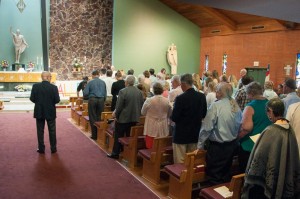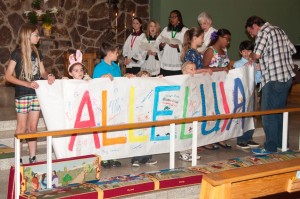 “I know exactly what you need to make Trinity great!”
“I know exactly what you need to make Trinity great!”
Having been doing this work for a few years now, I didn’t hold my breath in anticipation, but I was willing to hear of a possible solution. The visitor continued, describing a church he knew, with at least one family of parents and children, eager to be an active part of the congregation.
“You need ten families just like that,” he continued enthusiastically. “That would make Trinity a good congregation!”
More people–why hadn’t I thought of that? And then the really important question: Where can we order those ten families to solve all our problems?
OK, that’s probably a bit snarky, but church growth isn’t exactly a new suggestion. In this case, finding those ten families to come and fix Trinity is also a backwards solution. How many people would we attract if we invited them to come fix our problems? But are we really in the business to attracting people because of what they can do for us? Don’t we invite people for the sake of the Kingdom, not the institution?
As we celebrate Pentecost, let’s get our theology going the right direction. On the day of Pentecost, the Holy Spirit sent the disciples out to tell the story of salvation. No matter how institutional the church might be, its direction has to be outward, taking the message to others for their sake, not for institutional survival. Still, Pentecost doesn’t just recall an unusual experience in religious communication. The message and mission belong to the church, and the church is a communal experience. We’re not Christians alone. Theology of discipleship goes both ways.
This is the part we modern Christians aren’t very good at remembering. Dietrich Bonhoeffer wrote that as the Body of Christ, the Church takes up space. By this he meant that faith is not found in abstract doctrines and intellectual assertions. Faith does things. It takes up space in our lives, requiring time and attention. The Body of Christ takes up space in our world as Christians go out and do things in the name of Christ. The Church as community and institution is the visible part of the faith. In this case Trinity’s problems won’t be fixed by finding those ten magical families, but by sending its members out to take up space, faithfully living out the message in whatever way they can.
That might be a no-brainer, but it’s also not what we want to hear. The Internet is crowded with the stories of Christians who, for one reason or another, believe that they have out grown a need for church. The assumption is that more sophisticated, more authentic believers can do it on their own, no longer needing the crutch of doctrines, gatherings and community. We imagine that we can do better alone.
Maybe we could. It is certainly easier to remain calm and peaceful when you don’t have to deal with other Christians, with their odd habits, difficult personalities or wrong opinions. You can keep your theological understandings easily intact when you don’t see them challenged by the experiences and difficulties of others. You’re not going to lose your faith because of the bad behavior of a Christian community if you don’t join one. Is that enough?
In taking up space, the Body of Christ gets in the way. Bonhoeffer is the dramatic example of this call, of course, standing up to the Nazis, even at the cost of his own life. But it’s not always that dramatic. Sometimes the Church just gets in the way of our self-centered tendencies, or of our excuses and prejudices–any of the ways we avoid the call to follow Christ. By getting in the way, at its best the Church points us toward following Christ.
So how is this Good News? Not in a comfortable way, but definitely in a life-changing way. The Body of Christ can help us all to see God’s presence in the world. On a good day, that’s what the Church is doing. Instead of inviting people in to solve our problems, that’s even what Trinity is doing. We have a message to share. Pentecost reminds us to do that, and worry about the problems later.
What if we tell some of those stories for a change? Not just the stories of how the Church has failed, but let’s also hear about how the Church has challenged her members to do more. Where has the Holy Spirit used the Church to suggest reconciliation instead of division, community instead of competition, healing instead of guilt? How has the Church gotten in the way of business as usual in order to offer the option of the Kingdom? All Christians agree that’s the option we need. On Pentecost, the Holy Spirit gives us some help in getting there.
